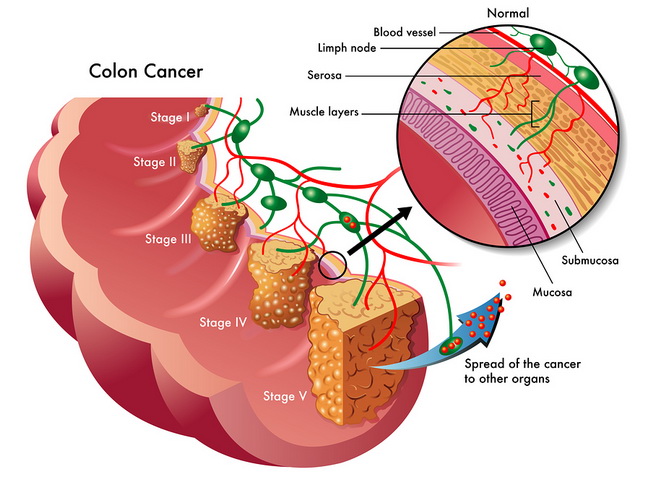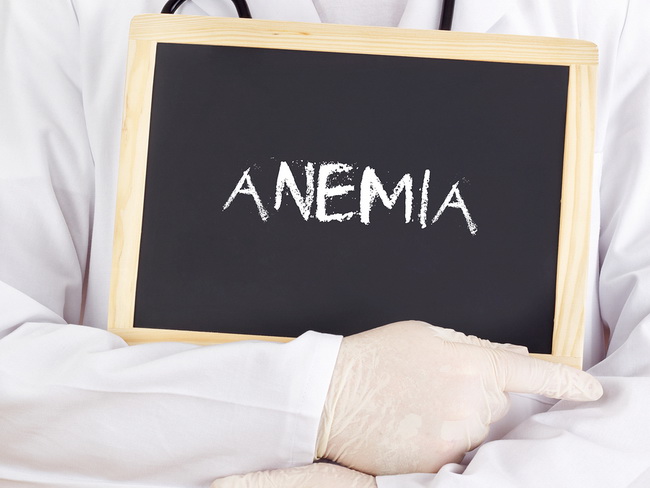- Make It Yourself Lavender Heart-Shaped Bath Bombs!
- 20 Things You Never Knew About “Down There”
- 12 Best Foods For Those Suffering From Arthritis Pain
- 12 Personal Hygiene Mistakes Almost Everyone Makes (Mom Never Told You About #4!)
- 15 Medicinal Plants And Herbs From The Cherokee People
- 12 Mind-Blowing Benefits Of Drinking Coconut Water During Pregnancy
- 12 Outstanding Winter Foods That Won’t Fatten You Up Like A Christmas Turkey
Top 11 Warnings Signs of Colorectal Cancer You Shouldn’t Ignore

Photo credit: bigstock.com
Although you might have heard that people with colon, rectal, or bowel cancer, generally referred to as simply colorectal cancer, have no symptoms or warning signs, this isn’t true for the most part. Many victims of this type of cancer state that they did have warnings signs, but for whatever reason, they chose to ignore them or dismiss them as some other type of minor health problem.
Since colorectal cancers are the third most common type of cancer diagnosed for both men and women, it’s important that you pay attention to the signs your body will give you. If you find that you are experiencing any of the 11 symptoms below, for your own peace of mind, you should see a doctor as soon as possible to rule out cancer. When caught early, this type of cancer has excellent chances of recovery.
Know the Risk Factors
- Family History – There is some evidence that shows that colon cancer might be hereditary. More than 20 percent of those with colorectal cancer had a close relative, either first degree or second degree relative, who also had this type of cancer.
- Obesity – Those who are morbidly obese also have an increased risk of developing this type of cancer.
- Diet – There is a very large amount of evidence that shows that a diet high in processed meats, red meat, and processed foods increases the risk of this type of cancer. A diet that is high in fiber, such as a plant based diet, will greatly decrease your risk.
- Smoking – Smokers have a greater chance of developing colorectal cancer, as well as other types of cancer and heart disease.
- Genetic Conditions – Some inherited conditions, such ashereditary non-polyposis colorectal cancer (AKA Lynch Syndrome), or FAP (asfamilial adenomatous polyposis), cause colorectal cancers.
- Excessive Alcohol – In one important study, called the EPIC study, alcohol, even small amounts of alcohol, was linked to the increased the risk of colorectal cancers. For every two glasses of alcohol a person drinks each day, the risk increases by 8 percent.
- Sedentary Lifestyle – Those who do not exercise and spend a great deal of time sitting are more likely to develop this type of cancer.
- Digestive Problems – People with Crohn’s disease, ulcerative colitis, and other digestive problems are also more likely to develop colorectal cancers.
- Cancer Survivors – Several studies showed a link between men who had previously had prostate or testicular cancer and colorectal cancer. Those who survived had a much greater chance of developing this type of cancer, not because it spread, but possibly due to the side effects of the type of cancer treatments they received.
- Diabetes – Those with type 2 diabetes have an increased risk.
- Racial/Ethnic Background – African Americans are more likely to develop colorectal cancer than any other racial group. Jews of Eastern European descent (Ashkenazi Jews) also have a high chance of developing this disease.
- Night Shift – Although scientists don’t know why, one study showed that people who work graveyard or night shift work for a minimum of 3 nights a week for 15 years or more are much more likely to develop colorectal cancers.
Continue to Page 2

Photo credit: bigstock
The signs and symptoms listed below have been mentioned by those who have experienced colorectal cancer. Although some of these can indicate other health problems, you should still consult with your physician.
1. Bathroom/Digestive Problems
Those who have been diagnosed with colon cancer will tell you that, in hindsight, they realize they were having problems, sometimes for years, but because some of these are embarrassing, or appeared to be something mild, they ignored them.
Some common problems experienced by those with colorectal cancer include:
- Chronic gas
- Diarrhea
- Constipation
- Sometimes all three of the above, alternately
- A feeling like you still have to “go” but can’t
- “Pencil” stools (small, thin, stools about the size of pencils)
- A diagnosis of IBS, colitis, or another type of bowel condition
Tumors and/or polyps in the large intestine or rectum narrow the lining or the opening out of the body, causing problems. Some people are given a diagnosis of IBS or some other bowel condition, only later to find out they actually had colorectal cancer.
2. Difficulty Passing Stools
Changes in your normal bathroom routine are always a cause for concern. You might feel as if you still have to go immediately after passing a stool. You might feel an urgent need to “go” but nothing happens and the feeling passes. If you suddenly strain to pass every stool, almost daily, then it’s time to visit your doctor.
YOU MIGHT ALSO LIKE: 40 Incredible and Common Foods That Will Starve Cancer to Death
3. Bloody Stools
If you see blood on, or mixed in, with your stools, this is often a sign of colorectal cancer. Sometimes the blood is bright red, other times it appears almost black, and other people report that it is sometimes a mixture of blood and yellow-green mucus. You should see your doctor to have a stool sample analysis to eliminate the possibility of colon cancer.
Continue to Page 3

Photo credit: bigstock.com
4. Abdominal Pain
Although everyone experiences abdominal pain or discomfort from time to time, but if you suffer regular bouts of abdominal pain, especially when combined with any other symptom on this list, you could be developing colorectal cancer.
5. Nausea and/or Vomiting
If you begin to experience persistent vomiting and/or nausea, for no apparent reason, you might be developing bowel cancer. It is possible to experience this symptom without abdominal pain or any other symptoms. Most people think that it was simply something they ate that didn’t agree with them and are reluctant to see a doctor for this minor symptom, but if this continues for several weeks, you should see a doctor as soon as possible.
6. Persistent Diarrhea
According to BMC Medicine, 1 in 5 people who are diagnosed with colorectal cancer, experience persistent, ongoing diarrhea that does not respond to typical medication.
7. Persistent Constipation
Although most people experience this symptom occasionally, when it persists for more than a few days, or if it recurs several times a month, you should see your doctor. Even if you don’t have colorectal cancer, persistent constipation can increase your risk of developing it.
Continue to Page 4

Photo credit: bigstock.com
8. Changes in Stool Color
If your stools suddenly change color, becoming very dark, (some say it looks almost maroon or dark purple in color, or sticky), this could be due to bleeding in the colon. Although you might have normal bowel movements in-between, if you notice any dramatic change in the color or size of your stools more than once a month, you should see your doctor.
9. Rectal Bleeding
Although rectal bleeding is sometimes caused by hemorrhoids, bleeding from the rectum occurs in more than 50 percent of those who are diagnosed with colorectal cancer. This blood is generally bright red and can be seen in the toilet, on the paper, or both.
10. Anemia
If you lose enough blood through your bowel movements or from rectal bleeding, you can become anemic, which is a shortage of red blood cells in your bloodstream. This can leave you feeling tired and weak, and even short of breath. In extreme cases, your skin can be very pale in color.
SEE ALSO: RoundUp (glyphosate) Causes Cancer, says World Health Organization
11. Dramatic Weight Loss
More than one third of those who are diagnosed with colorectal cancers will lose significant quantities of weight, even though they are eating normally. Others experience a complete loss of appetite. If you are losing weight unexpectedly, especially in combination with any of the other symptoms listed here, see your doctor as soon as possible.
If you have any of the above symptoms, don’t be embarrassed and put off a visit to your doctor. Your life may depend on an early diagnosis.
References:
































